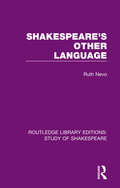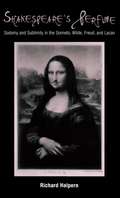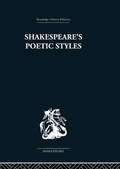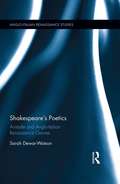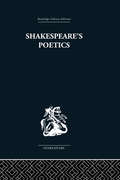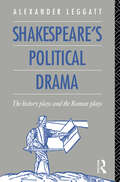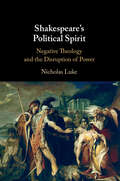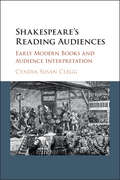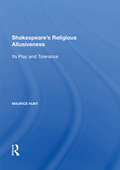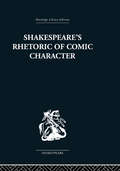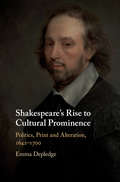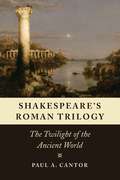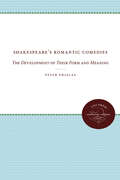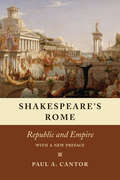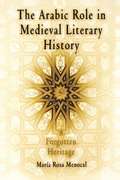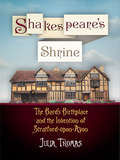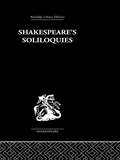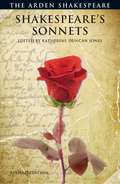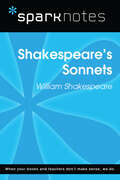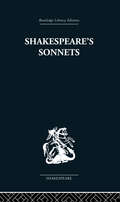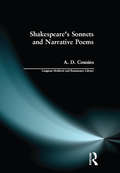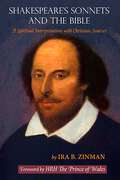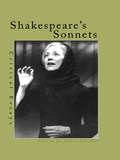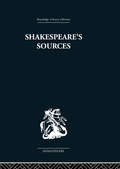- Table View
- List View
Shakespeare's Other Language (Routledge Library Editions: Study of Shakespeare)
by Ruth NevoShakespeare’s last plays, the tragicomic Romances, are notoriously strange plays, riddled with fabulous events and incredible coincidences, magic and dream. These features have sometimes been interpreted as the carelessness of an of an aging dramatist weary of his craft, or justified as folklore motifs, suitable to the romance tale. But neither view explains the fascination and power these plays still exert. Originally published in 1987, Ruth Nevo’s book offers a reading of the plays which invokes the findings and methods of post-psychoanalytic semiotics. Drawing on a Lacanian model of the "textual unconscious", she embarks on searching analyses of Pericles, Cymbeline, The Winter’s Tale, and The Tempest, brilliantly illuminating their apparent absurdities and anomalies, their bizarre or preposterous events and obscurely motivated actions, their often puzzling syntax. Her investigation of the plays’ informing fantasies produces unified and enriched readings which serve both to rehabilitate those plays which have been less than highly thought of, and to disclose new significance in the acknowledged masterpieces.
Shakespeare's Perfume: Sodomy and Sublimity in the Sonnets, Wilde, Freud, and Lacan
by Richard HalpernStarting with St. Paul's argument that the Greeks were afflicted with homosexuality to punish their excessive love of statues, Richard Halpern uncovers a tradition in which aesthetic experience gives birth to the sexual—and thus reverses the Freudian thesis that erotic desire is sublimated into art. Rather, Halpern argues, sodomy was implicated with aesthetic categories from the very start, as he traces a connection between sodomy and the unrepresentable that runs from Shakespeare's Sonnets to Oscar Wilde's novella The Portrait of Mr. W.H., Freud's famous essay on Leonardo da Vinci, and Jacques Lacan's seminar on the ethics of psychoanalysis. Drawing on theology, alchemy, psychoanalysis, philosophy, and literary criticism, Shakespeare's Perfume explores how the history of aesthetics and the history of sexuality are fundamentally connected.
Shakespeare's Poetic Styles: Verse into Drama
by John BaxterFirst published in 1980. At their most successful, Shakespeare's styles are strategies to make plain the limits of thought and feeling which define the significance of human actions. John Baxter analyses the way in which these limits are reached, and also provides a strong argument for the idea that the power of Shakespearean drama depends upon the co-operation of poetic style and dramatic form. Three plays are examined in detail in the text: The Tragedy of Mustapha by Fulke Greville and Richard II and Macbeth by Shakespeare.
Shakespeare's Poetics: Aristotle and Anglo-Italian Renaissance Genres (Anglo-Italian Renaissance Studies)
by Sarah Dewar-WatsonThe startling central idea behind this study is that the rediscovery of Aristotle's Poetics in the sixteenth century ultimately had a profound impact on almost every aspect of Shakespeare's late plays”their sources, subject matter and thematic concerns. Shakespeare's Poetics reveals the generic complexity of Shakespeare's late plays to be informed by contemporary debates about the tonal and structural composition of tragicomedy. Author Sarah Dewar-Watson re-examines such plays as The Winter's Tale, Pericles and The Tempest in light of the important work of reception which was undertaken in Italy by pioneering theorists such as Giambattista Giraldi Cinthio (1504-73) and Giambattista Guarini (1538-1612). The author demonstrates ways in which these theoretical developments filtered from their intellectual base in Italy to the playhouses of early modern England via the work of dramatists such as Jonson and Fletcher. Dewar-Watson argues that the effect of this widespread revaluation of genre not only extends as far as Shakespeare, but that he takes a leading role in developing its possibilities on the English stage. In the course of pursuing this topic, Dewar-Watson also engages with several areas of current scholarly debate: the nature of Shakespeare's authorship; recent interest in and work on Shakespeare's later plays; and new critical work on Italian language-learning in Renaissance England. Finally, Shakespeare's Poetics develops current critical thinking about the place of Greek literature in Renaissance England, particularly in relation to Shakespeare.
Shakespeare's Poetics: In relation to King Lear
by Russell A FraserFirst published in 1962. This volume gives as complete an account as possible of the Shakespearian experience, particularly in terms of one play, King Lear, but in general against the context of all of Shakespeare's work and that of the age in which it was created. Chapters cover: King Lear in the Renaissance; Providence; Kind; Fortune; Anarchy and Order; Reason and Will; Show and Substance; Redemption and Shakespeare's Poetics.
Shakespeare's Political Drama: The History Plays and the Roman Plays
by Alexander LeggattFirst published in 1989. Routledge is an imprint of Taylor & Francis, an informa company.
Shakespeare's Political Spirit: Negative Theology and the Disruption of Power
by Nicholas LukeThis exciting and challenging study reorients how we think about politics in Shakespeare and on the early modern stage. By reading Shakespeare's political drama as a negative mode of political experience and thought, Nicholas Luke allows us to appreciate the imaginative and disruptive elements of plays that might seem politically pessimistic. Drawing on a long religious and philosophical tradition of negativity and considering the writings of Hegel, Kierkegaard, Benjamin, Adorno, Derrida and Badiou, Luke pursues a phenomenology of political spirit that looks to the creative potential of experiences of failure, haunting, estrangement, impasse and dream. Through his notion of a negative political theology, he challenges traditional understandings of political theology and shows that Shakespeare's drama of negativity is more than a form of pessimistic critique, but rather a force of freedom and invention that animates the political imaginations of its audience.
Shakespeare's Possible Worlds
by Simon PalfreyNew methods are needed to do justice to Shakespeare. His work exceeds conventional models, past and present, for understanding playworlds. In this book, Simon Palfrey goes right to the heart of early modern popular drama, revealing both how it works and why it matters. Unlike his contemporaries, Shakespeare gives independent life to all his instruments, and to every fraction and fragment of the plays. Palfrey terms these particles 'formactions' - theatre-specific forms that move with their own action and passion. Palfrey's book is critically daring in both substance and format. Its unique mix of imaginative gusto, thought experiments, and virtuosic technique generates piercing close readings of the plays. There is far more to playlife than meets the eye. Influenced by Leibniz's visionary original model of possible worlds, Palfrey opens up the multiple worlds of Shakespeare's language, scenes, and characters as never before.
Shakespeare's Reading Audiences: Early Modern Books and Audience Interpretation
by Cyndia Susan CleggThis study grows out of the intersection of two realms of scholarly investigation - the emerging public sphere in early modern England and the history of the book. <P><P>Shakespeare's Reading Audiences examines the ways in which different communities - humanist, legal, religious and political - would have interpreted Shakespeare's plays and poems, whether printed or performed. <P>Cyndia Susan Clegg begins by analysing elite reading clusters associated with the Court, the universities, and the Inns of Court and how their interpretation of Shakespeare's Sonnets and Henry V arose from their reading of Italian humanists. <P><P>She concludes by examining how widely held public knowledge about English history both affected Richard II's reception and how such knowledge was appropriated by the State. <P>She also considers The Merry Wives of Windsor, Henry V, and Othello from the point of view of audience members conversant in popular English legal writing and Macbeth from the perspective of popular English Calvinism.
Shakespeare's Religious Allusiveness: Its Play and Tolerance (Shakespeare Studies)
by Maurice HuntShakespeare's Religious Allusiveness complicates debates about whether Shakespeare's plays are fundamentally Protestant or Catholic in sympathy, challenging analyses that either find Protestant elements consistently undercutting Catholic motifs or, less often, discover evidence of the playwright's endorsement of Catholic doctrine and customs. Rather, Maurice Hunt argues that Shakespeare's syncretistic method of incorporating both Protestant and Catholic elements into his plays was singular among early modern English playwrights at a time when governmental and social tolerance of Protestantism in the theatre was high and criticism of stereotyped Catholicism was correspondingly rampant in drama. In-depth discussions of The Two Gentlemen of Verona, the Second Henriad, All's Well That Ends Well, Twelfth Night, and Othello reveal how Shakespeare allusively integrates Reformation Protestant and Roman Catholic motifs and systems of thought. This book sheds new light on the playwright's knowledge of and interest in Elizabethan and Jacobean religious debates over the nature of spiritual reformation, the efficacy of merit for redemption, and the operation of Providence. It will appeal not only to Shakespeare scholars but to those interested in the cultural history of the Reformation.
Shakespeare's Rhetoric of Comic Character: Dramatic Convention In Classical And Renaissance Comedy
by Karen NewmanFirst published in 1985. In this revisionist history of comic characterization, Karen Newman argues that, contrary to received opinion, Shakespeare was not the first comic dramatist to create self-conscious characters who seem 'lifelike' or 'realistic'. His comic practice is firmly set within a comic tradition which stretches from Plautus and Menander to playwrights of the Italian Renaissance.
Shakespeare's Rise to Cultural Prominence: Politics, Print and Alteration, 1642–1700
by Emma DepledgeShakespeare's rise to prominence was by no means inevitable. While he was popular in his lifetime, the number of new editions and revivals of his plays declined over the following decades. Emma Depledge uses the methodologies of book and theatre history to provide a re-assessment of the reputation and dissemination of Shakespeare during the Interregnum and Restoration. She demonstrates the crucial role of the Exclusion Crisis (1678–1682), a political crisis over the royal succession, as a foundational moment in Shakespeare's canonisation. The period saw a sudden surge of theatrical alterations and a significantly increased rate of new editions and stage revivals. In the wake of the Exclusion Crisis, Shakespeare's plays were made available on a scale not witnessed since the early seventeenth century, thus reversing what might otherwise have been a permanent disappearance of his drama from canonical familiarity and firmly establishing Shakespeare's work in the national cultural imagination.
Shakespeare's Roman Trilogy: The Twilight of the Ancient World
by Paul A. CantorPaul A. Cantor first probed Shakespeare’s Roman plays—Coriolanus, Julius Caeser, and Antony and Cleopatra—in his landmark Shakespeare’s Rome (1976). With Shakespeare’s Roman Trilogy, he now argues that these plays form an integrated trilogy that portrays the tragedy not simply of their protagonists but of an entire political community. Cantor analyzes the way Shakespeare chronicles the rise and fall of the Roman Republic and the emergence of the Roman Empire. The transformation of the ancient city into a cosmopolitan empire marks the end of the era of civic virtue in antiquity, but it also opens up new spiritual possibilities that Shakespeare correlates with the rise of Christianity and thus the first stirrings of the medieval and the modern worlds. More broadly, Cantor places Shakespeare’s plays in a long tradition of philosophical speculation about Rome, with special emphasis on Machiavelli and Nietzsche, two thinkers who provide important clues on how to read Shakespeare’s works. In a pathbreaking chapter, he undertakes the first systematic comparison of Shakespeare and Nietzsche on Rome, exploring their central point of contention: Did Christianity corrupt the Roman Empire or was the corruption of the Empire the precondition of the rise of Christianity? Bringing Shakespeare into dialogue with other major thinkers about Rome, Shakespeare’s Roman Trilogy reveals the true profundity of the Roman Plays.
Shakespeare's Romantic Comedies: The Development of Their Form and Meaning
by Peter G. PhialasPhialas provides commentaries on Shakespeare's romantic comedies, treats in detail individual scenes and characters, and makes illuminating comparisons and contrasts of character with character. The chief concern of the book is with the action of each play, the nature and relationship of its parts, and the meaning that the action dramatizes.Originally published in 1966.A UNC Press Enduring Edition -- UNC Press Enduring Editions use the latest in digital technology to make available again books from our distinguished backlist that were previously out of print. These editions are published unaltered from the original, and are presented in affordable paperback formats, bringing readers both historical and cultural value.
Shakespeare's Rome: Republic and Empire
by Paul A. CantorFor more than forty years, Paul Cantor’s Shakespeare’s Rome has been a foundational work in the field of politics and literature. While many critics assumed that the Roman plays do not reflect any special knowledge of Rome, Cantor was one of the first to argue that they are grounded in a profound understanding of the Roman regime and its changes over time. Taking Shakespeare seriously as a political thinker, Cantor suggests that his Roman plays can be profitably studied in the context of the classical republican tradition in political philosophy. In Shakespeare’s Rome, Cantor examines the political settings of Shakespeare’s Roman plays, Coriolanus and Antony and Cleopatra, with references as well to Julius Caesar. Cantor shows that Shakespeare presents a convincing portrait of Rome in different eras of its history, contrasting the austere republic of Coriolanus, with its narrow horizons and martial virtues, and the cosmopolitan empire of Antony and Cleopatra, with its “immortal longings” and sophistication bordering on decadence.
Shakespeare's Schoolroom: Rhetoric, Discipline, Emotion
by Lynn EnterlineShakespeare's Schoolroom places moments of considerable emotional power in Shakespeare's poetry—portraits of what his contemporaries called "the passions"—alongside the discursive and material practices of sixteenth-century English pedagogy. Humanist training in Latin grammar and rhetorical facility was designed to intervene in social reproduction, to sort out which differences between bodies (male and female) and groups (aristocrats, the middling sort, and those below) were necessary to producing proper English "gentlemen." But the method adopted by Lynn Enterline in this book uncovers a rather different story from the one schoolmasters invented to promote the social efficacy of their pedagogical innovations. Beginning with the observation that Shakespeare frequently reengaged school techniques through the voices of those it excluded (particularly women), Enterline shows that when his portraits of "love" and "woe" betray their institutional origins, they reveal both the cost of a Latin education as well as the contradictory conditions of genteel masculinity in sixteenth-century Britain.In contrast to attempts to explain early modern emotion in relation to medical discourse, Enterline uncovers the crucial role that rhetoric and the texts of the classical past play in Shakespeare's passions. She relies throughout on the axiom that rhetoric has two branches that continuously interact: tropological (requiring formal literary analysis) and transactional (requiring social and historical analysis). Each chapter moves between grammar school archives and literary canon, using linguistic, rhetorical, and literary detail to illustrate the significant difference between what humanists claimed their methods would achieve and what the texts of at least one former schoolboy reveal about the institution's unintended literary and social consequences. When Shakespeare creates the convincing effects of character and emotion for which he is so often singled out as a precursor of "modern" subjectivity, he signals his debt to the Latin institution that granted him the cultural capital of an early modern gentleman precisely when undercutting the socially normative categories schoolmasters invoked as their educational goal.
Shakespeare's Shrine
by Julia ThomasAnyone who has paid the entry fee to visit Shakespeare's Birthplace on Henley Street in Stratford-upon-Avon--and there are some 700,000 a year who do so--might be forgiven for taking the authenticity of the building for granted. The house, as the official guidebooks state, was purchased by Shakespeare's father, John Shakespeare, in two stages in 1556 and 1575, and William was born and brought up there. The street itself might have changed through the centuries--it is now largely populated by gift and tea shops--but it is easy to imagine little Will playing in the garden of this ancient structure, sitting in the inglenook in the kitchen, or reaching up to turn the Gothic handles on the weathered doors.In Shakespeare's Shrine Julia Thomas reveals just how fully the Birthplace that we visit today is a creation of the nineteenth century. Two hundred years after Shakespeare's death, the run-down house on Henley Street was home to a butcher shop and a pub. Saved from the threat of an ignominious sale to P. T. Barnum, it was purchased for the English nation in 1847 and given the picturesque half-timbered façade first seen in a fanciful 1769 engraving of the building. A perfect confluence of nationalism, nostalgia, and the easy access afforded by rail travel turned the house in which the Bard first drew breath into a major tourist attraction, one artifact in a sea of Shakespeare handkerchiefs, eggcups, and door-knockers.It was clear to Victorians on pilgrimage to Stratford just who Shakespeare was, how he lived, and to whom he belonged, Thomas writes, and the answers were inseparable from Victorian notions of class, domesticity, and national identity. In Shakespeare's Shrine she has written a richly documented and witty account of how both the Bard and the Warwickshire market town of his birth were turned into enduring symbols of British heritage--and of just how closely contemporary visitors to Stratford are following in the footsteps of their Victorian predecessors.
Shakespeare's Soliloquies
by Wolfgang Clemen Ingeborg BoltzFirst published in 1987. Often the best known and most memorable passages in Shakespeare's plays, the soliloquies, also tend to be the focal points in the drama. Twenty-seven soliloquies are examined in this work, illustrating how the spectator or reader is led to the soliloquy and how the drama is continued afterwards. The detailed structure of each soliloquy is discussed, as well as examining them within the structure of the entire play - thereby extending the interpretation of the work as a whole.
Shakespeare's Sonnets (The Arden Shakespeare, Third Series)
by William Shakespeare Katherine Duncan-JonesThe author Katherine Duncan Jones explores the issues of sexuality to be found in poems of Shakespeare, making this a truly modern edition for todays readers and students. This revised edition has been updated and corrected in the light of new scholarship and critical thinking since its first publication.
Shakespeare's Sonnets (SparkNotes Literature Guide Series)
by SparkNotesShakespeare's Sonnets (SparkNotes Literature Guide) by William Shakespeare Making the reading experience fun! Created by Harvard students for students everywhere, SparkNotes is a new breed of study guide: smarter, better, faster. Geared to what today's students need to know, SparkNotes provides: *Chapter-by-chapter analysis *Explanations of key themes, motifs, and symbols *A review quiz and essay topicsLively and accessible, these guides are perfect for late-night studying and writing papers
Shakespeare's Sonnets (Unwin Critical Library)
by Kenneth MuirThis edition first published in 1979. Discussing Shakespeare's sonnets in relation to sonnets by Italian, French and English poets, Kenneth Muir shows how they were influenced by Shakespeare's reading of Sidney, Erasmus and Ovid and discusses their art in terms of construction, sound patterns and imagery. He considers the relationship of the sonnets to Shakespeare's dramatic writing, while stressing the dramatic element in the sonnets themselves. Finally he surveys the changing attitudes to the sonnets during the last three centuries.
Shakespeare's Sonnets and Narrative Poems (Longman Medieval and Renaissance Library)
by A. D. CousinsAlongside Spenser, Sidney and the early Donne, Shakespeare is the major poet of the 16th century, largely because of the status of his remarkable sequence of sonnets. Professor Cousins' new book is the first comprehensive study of the Sonnets and narrative poems for over a decade. He focuses in particular on their exploration of self-knowledge, sexuality, and death, as well as on their ambiguous figuring of gender. Throughout he provides a comparative context, looking at the work of Shakespeare's contemporaries. The relation between Shakespeare's non-dramatic verse and his plays is also explored.
Shakespeare's Sonnets and the Bible: A Spiritual Interpretation with Christian Sources
by Ira B. Zinman2009 marks the 400th anniversary of the publication of William Shakespeare&’s Sonnets. For centuries there has been a raging debate about whether or not Shakespeare was a spiritual person and the extent to which he used the Bible as a source and inspiration in his work. While Shakespeare&’s plays have garnered much of the attention, discussions have seldom presented a complete exploration of his Sonnets. This book gives a detailed examination of Shakespeare&’s Sonnets, identifying their underlying themes at the religious and scriptural levels of interpretation. Christian readers and admirers of Shakespeare will be fascinated to learn the extent to which the most widely read author in the English-speaking world relied upon the Bible as an inspiration for his work.
Shakespeare's Sonnets: Critical Essays (Shakespeare Criticism #No. 20)
by James SchifferShakespeare's Sonnets: Critical Essays is the essential Sonnets anthology for our time. This important collection focuses exclusively on contemporary criticism of the Sonnets, reprinting three highly influential essays from the past decade and including sixteen original analyses by leading scholars in the field. The contributors' diverse approaches range from the new historicism to the new bibliography, from formalism to feminism, from reception theory to cultural materialism, and from biographical criticism to queer theory. In addition, James Schiffer's introduction offers a comprehensive survey of 400 years of criticism of these fascinating, enigmatic poems.
Shakespeare's Sources: Comedies and Tragedies
by Kenneth MuirFirst published in 1957. This book finds discovers what the sources to Shakespeare's Comedies and Tragedies really were, considers the dramatic reasons for Shakespeare's departure from them and provides many examples of the way in which he made use of his general reading for particular scenes and speeches. Kenneth Muir shows that Shakespeare frequently uses more than one source and sometimes as many as eight.
